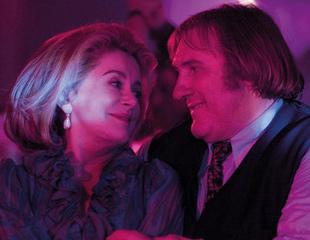We’ve all seen the pic of Catherine Deneuve in her red track suit, and now we’ve got two more to pad up our enthusiasm for what could be a great film from distinguished filmmaker François Ozon. Potiche is receiving its world premiere in Venice and is tethered to a logical release at TIFF, and what I’m expecting is a lighter commentary on gender and class differences — a break from the seriousness we find in his last film Le Refuge (opens next month in L.A and New York next month), the pic describes how a bourgeois housewife takes on a rough union leader (Gerard Depardieu) by getting cosy with him. Why this wasn’t included in Cannes is baffling – look for this import to be high up on the list of priorities for Sony Pictures Classics, IFC Films and nay of the distributors who might have picked up his films in the past such as Focus and Strand.
Adapted by the director from Pierre Barillet and Jean-Pierre Grédy’s eponymous play, Potiche is set in a French bourgeois province in 1977. Suzanne (Deneuve) is the submissive wife of rich industrialist Robert Pujol (Luchini), who runs his umbrella factory with an iron hand and turns out to be just as nasty and tyrannical with his workers as he is with his mistress (Viard), children (Renier and Godrèche) and “trophy” wife. After the workers go on strike and hold Robert captive, Suzanne ends up managing the factory, instead of her husband, who is disowned by the staff. Distressed and in poor health, Robert goes away for a while and, to the surprise of most, Suzanne proves to be an assertive woman of action. With the help of the communist deputy, her former lover Maurice Babin (Depardieu), she puts an end to the strike, gets the factory running again and improves the employees’ working conditions. But when Robert returns from his trip in good health, the situation gets complicated.
